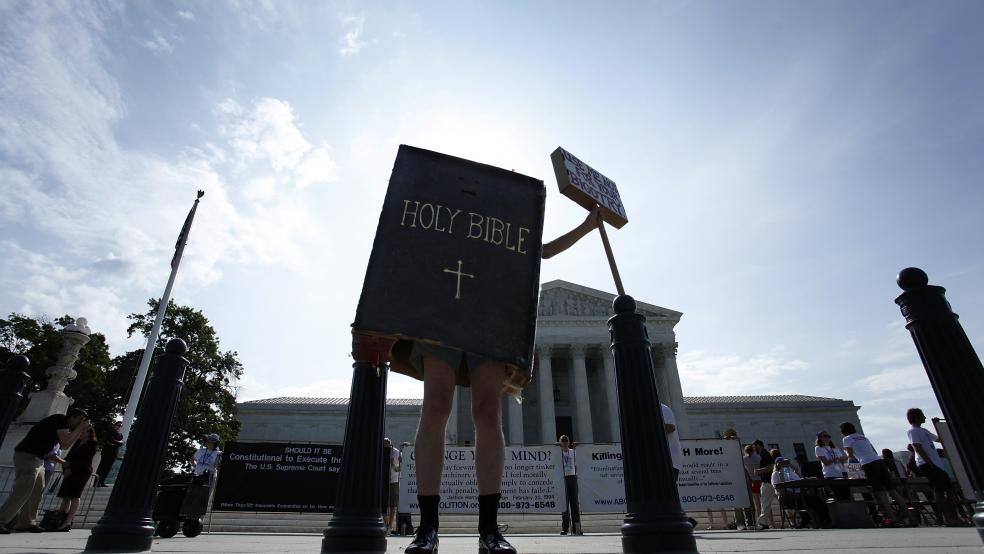The Supreme Court just dealt a blow to the White House by ruling that the Obamacare provision requiring employers to provide contaceptives as part of their health insurance plans violates the religious liberties of some small businesses.
In a 5-4 vote with the majority opinion written by Justice Samuel Alito, the Court sided with craft store chain Hobby Lobby—and ruled that Obamacare’s contraceptive mandate violates the Religious Freedom Restoration Act (RFRA) with regards to closely held for-profit corporations.
Related: Obamacare Contraception Mandate Hangs on SCOTUS
Hobby Lobby’s owners, the Green family, challenged the contraceptive mandate. They morally object to several types of birth control that they consider forms of abortion—including the morning-after pill and some intrauterine devices.
The court wrote that smaller companies like Hobby Lobby with five or fewer people controlling at least 50 percent of the company’s total stock should be exempt from the mandate, since it “substantially burdens the exercise of religion.”
“The Government has failed to show that the contraceptive mandate is the least restrictive means of furthering that interest," Alito wrote.
The justices did not strike down the entire mandate—but ruled more exemptions for smaller companies. The law already excludes churches and other religious organizations; however, the Court’s decision further chips away at the mandate’s reach.
Related: Obama Mocks Congress One Day After SCOTUS Ruling
Some religious groups cheered the Court’s decision saying the law had unfairly targeted religious business owners who were forced to decide whether they had to either violate “deeply held moral beliefs and comply by paying for drugs and services” to which they object, or “pay crippling fines of up to $100 per day, per employee, for non-compliance.”
Family Research Council President Tony Perkins said in a statement, “This mandate threatened the jobs, livelihood and health care of millions of Americans and forced those who stood up for their conscience, like Hobby Lobby and Conestoga Wood, to either comply or be punished.”
The ruling is bad news for the president, who promised that under his signature health care law, people could get all contraceptives at no cost.
Now female rights advocates are concerned that this could create a cost burden for female employees working at companies exercising their new exemption to the mandate. Maybe. But Planned Parenthood says Plan B One-Step and Next Choice are available over the counter at many pharmacies for women over 17. It may cost anywhere from $10 to $50.
In Alito’s opinion, he suggested that the government could step in and provide contraceptive coverage for workers at these companies.
"There are other ways in which Congress or HHS could equally ensure that every woman has cost-free access to the particular contraceptives at issue here and, indeed, to all FDA-approved contraceptives," Alito wrote. Of course, that raises questions over funding and about how many additional people would need to be covered by the federal government.
The ruling also raises concern from some who say it might open the door to more employee exemptions.
“We are gravely disappointed in today’s decision from the Supreme Court,” Sandy Sorenson, director of the United Church of Christ’s Washington, D.C. office said in a statement. “Today’s ruling may embolden private employers to claim religious objections to particular health care services, in effect forcing their own religious views upon their employees.”
The Court’s opinion, however, was written very narrowly, so it only applies to the contraception mandate, not to religious employers who object to other medical services, like blood transfusions or vaccines. "Nor does it provide a shield for employers who might cloak illegal discrimination as a religious practice," Alito added in the opinion.
Paul Pizzo, attorney for Tampa-based Buchanan Ingersoll & Rooney/Fowler White Boggs who handled a similar case in Florida, said he doesn’t expect wider implications of the ruling for now, since the opinion was written so narrowly.
“There will be very limited implications for now, but who knows what will come out of the woodwork,” Pizzo said, referring to the possibility of other corporations bringing similar cases in the future.
Top Reads from the Fiscal Times:





